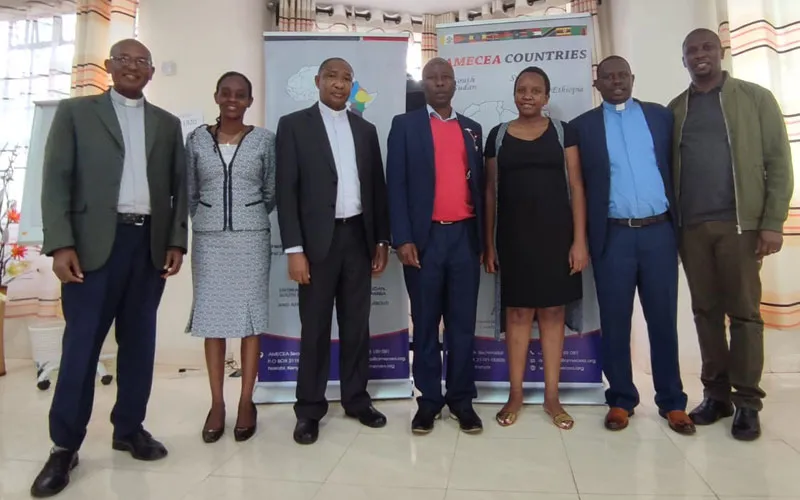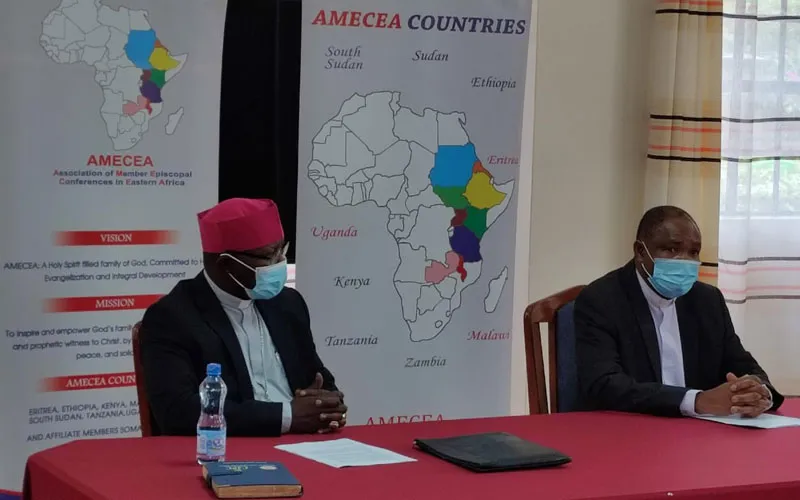“The loss of lives in our region due to COVID -19 is regrettable, yet on the whole we thank God for the protection granted to our region so far. The human ingenuity towards development of vaccines, drugs and other interventions is commendable” they said in the statement signed by Bishop Oballa.
They called for equity in vaccine distribution across the world and encouraged the faithful to not only get vaccinated but also promote an environment that will boost immunity by adhering to established practices and lifestyle.
“We continue to encourage the faithful and other people of goodwill to not only take the vaccine but also abide by the established practices and lifestyle necessary to enhance their immunity,” they said, and added, “AMECEA however urges the governments in our countries to respect individual rights and liberties as it enforces responses to COVID-19.”
The Eastern African Bishops further highlighted the issue of human trafficking in the region and said that the region is tagged as the “source, transit and destination for trafficking in persons.”
 Some of the participants at the AMECEA conference. Credit: Arnold Neliba
Some of the participants at the AMECEA conference. Credit: Arnold Neliba
(Story continues below)
“We affirm the Church commitment to intervene in every phase of trafficking of human beings; to protect them from deception and solicitation; to find them and free them when they are transported and reduced to slavery; and to provide safe places for them to enable seamless integration,” the Bishops of AMECEA said.
“We commend the various organizations involved in raising awareness and responding to situations of individuals in crisis, focusing on Prevention, Protection and Prosecution,” they also said, and added, “We encourage collaboration among actors and government agencies to streamline border operations in identification and rescue.”
In their December 2 collective statement, Bishops of AMECEA also called on governments in the Eastern African region to desist from actions that they said generate displacement and refugees. They said, “Collaboration in searching for lasting solutions for those displaced remains imperative.”
“Africa’s refugee and the Internally Displaced Persons crisis stretches from the Lake Chad Basin through the Great Lakes Region to the Horn of Africa. The numbers of internally displaced in these regions are likely higher than estimates suggest,” they said.
The Catholic Church leaders in Eastern Africa also expressed their concerns about the issue of unemployment among the youth, saying that the region has the highest number of youth in the world.
“The dire unemployment situation for young people across Africa continues to undermine their potential. The Church is cognizant of the high number of unemployed youth that could provide ready recruits for insurgents and radicalization,” they said at the conclusion of the workshop organized by the PIHD of AMECEA.
“We encourage our youths to actively participate in national, regional and continental initiatives towards improving employment opportunities. We implore the governments to develop and create opportunities that can empower the youth,” the Bishops of AMECEA added.
They further expressed their concerns about radicalism and extremism, which they said is taking place in some countries within the region and in Africa in general.
The Bishops linked radicalization and extremism in the region to “interreligious apathy, youth unemployment, mismanagement of resources, corruption, internal displacement of the people and the ever growing gap between the rich and the poor.”
“We recommend countering violent extremism through interreligious dialogue and inclusion of the youth in social economic activities,” they said.
The Bishops also expressed their concern about the issue of environmental degradation in the region and disclosed the role of AMECEA in the push for climate change through operationalization of Laudato Si’.
They cautioned against individualism and said that if the vice is avoided, a relevant sustainable lifestyle will be adopted and that results will be seen in a well-preserved environment.
On the issue of governance and elections, the Catholic Bishops of AMECEA encouraged politicians and people’s representatives to collaborate regionally towards affirming each other’s initiatives and legislative agenda.
“AMECEA calls all believers and people of goodwill to faithful citizenship where they contribute to framing the issues of concern in their countries. By participating in the civic, peace building and electoral processes, the Catholic faithful participates in evangelization,” the Bishops say.
They add, “The expression of the will of the people in selecting and electing leaders should always be respected.”
“The Church in AMECEA calls for dialogue with the people, with the governments, with the political leaders and with the environment. The faithful and people of good will are urged to be proactive in prevention of conflict, intentional about peace making and peace building,” the Bishops of AMECEA say in their December 2 statement.
Silas Mwale Isenjia is a Kenyan journalist with a great zeal and interest for Catholic Church related communication. He holds a Bachelor’s Degree in Linguistics, Media and Communication from Moi University in Kenya. Silas has vast experience in the Media production industry. He currently works as a Journalist for ACI Africa.





 Some of the participants at the AMECEA conference.
Some of the participants at the AMECEA conference. 


